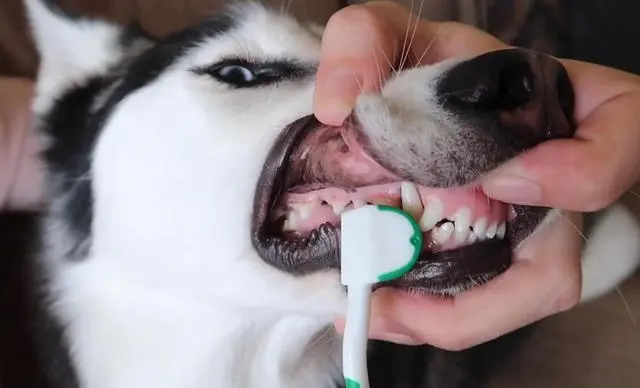Maintaining your dog’s dental health is crucial for their overall well-being. Just like humans, dogs can suffer from various dental issues that can lead to discomfort, pain, and serious health problems. This guide will explore common dental issues in dogs, their causes, symptoms, and effective solutions.

1. The Importance of Dental Health for Dogs
Why Dental Health Matters
Good dental hygiene is vital for your dog’s overall health. Poor dental care can lead to:
- Periodontal Disease: A severe gum infection that can affect your dog’s teeth and jaw.
- Tooth Loss: As infections worsen, teeth may loosen and fall out.
- Systemic Health Issues: Bacteria from dental infections can enter the bloodstream, potentially affecting the heart, liver, and kidneys.
Signs of Dental Problems
Regularly check your dog’s mouth for these signs of dental issues:
- Bad breath (halitosis)
- Red or swollen gums
- Loose or missing teeth
- Excessive drooling
- Difficulty eating
2. Common Dental Issues in Dogs
2.1. Periodontal Disease
Causes and Symptoms
Periodontal disease is one of the most common dental issues in dogs. It starts with plaque buildup, leading to tartar, which can inflame the gums and create pockets of infection.
Symptoms to Watch For:
- Bleeding gums
- Pain while chewing
- Foul breath
- Swelling around the teeth
2.2. Tooth Decay
What Causes Tooth Decay?
Tooth decay occurs when bacteria produce acids that erode tooth enamel. This can lead to cavities, pain, and potential tooth loss.
Symptoms:
- Discomfort while eating
- Visible holes or dark spots on teeth
- Increased pawing at the mouth
2.3. Broken Teeth
How Do Teeth Get Broken?
Dogs can break their teeth by chewing hard objects, such as bones or toys. Broken teeth can be painful and lead to infections.
Signs of Broken Teeth:
- Sudden changes in eating habits
- Blood in the mouth
- Whining or yelping when chewing
3. Preventative Dental Care
3.1. Regular Tooth Brushing
Why Brush Your Dog’s Teeth?
Brushing your dog’s teeth regularly helps remove plaque and prevent tartar buildup. Aim to brush their teeth at least two to three times a week.
How to Brush:
- Use a toothbrush designed for dogs and toothpaste formulated for pets.
- Start by letting your dog taste the toothpaste.
- Gradually introduce the toothbrush, gently brushing in circular motions.
3.2. Dental Chews and Treats
Benefits of Dental Chews
Dental chews can help reduce plaque and tartar while keeping your dog entertained. Look for products that have the Veterinary Oral Health Council (VOHC) seal of approval.
3.3. Professional Cleanings
When to Schedule Professional Cleanings
Regular veterinary dental cleanings are essential. Most veterinarians recommend an annual cleaning to ensure thorough removal of tartar and inspection for dental issues.
4. Home Remedies for Dental Health
4.1. Coconut Oil
Coconut Oil Benefits
Coconut oil can be beneficial for your dog’s dental health. It contains lauric acid, which has antimicrobial properties. Consider adding a small amount to your dog’s food or using it while brushing.
4.2. Carrots and Apples
Healthy Snacks for Dental Health
Fresh fruits and vegetables like carrots and apples can help clean your dog’s teeth naturally. These crunchy snacks promote chewing and can reduce plaque buildup.
5. Recognizing and Responding to Dental Emergencies
5.1. Signs of Dental Emergencies
When to Seek Immediate Veterinary Care
If your dog exhibits any of the following symptoms, seek veterinary care immediately:
- Severe bleeding from the mouth
- Swelling in the jaw
- Uncontrolled drooling
- Signs of pain, such as whining or reluctance to eat
5.2. Emergency Care Options
What to Expect at the Vet
When you take your dog to the vet for a dental emergency, the veterinarian may perform:
- An oral examination
- X-rays to assess the health of the teeth and jawbone
- Possible extraction or treatment of the affected teeth
6. Long-term Dental Care Strategies
6.1. Establish a Routine
Creating a Dental Care Routine
Establishing a regular dental care routine is vital. Include daily brushing, regular vet check-ups, and dental treats to maintain your dog’s dental health.
6.2. Educate Yourself
Stay Informed About Dental Health
Stay informed about your dog’s dental health by consulting with your veterinarian. Understanding potential dental issues will help you act quickly if problems arise.
Conclusion
Maintaining your dog’s dental health is crucial for their overall well-being. By recognizing common dental issues and implementing effective prevention strategies, you can ensure your furry friend stays healthy and happy. Regular dental care, a balanced diet, and professional check-ups will go a long way in preserving your dog’s dental health.

Comments (0)